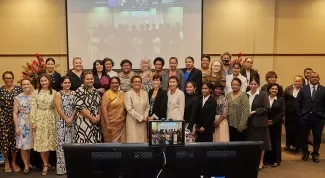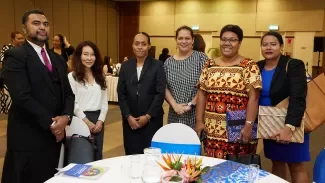ADB Hosts Asia-Pacific Conference on Gender-Responsive Judicial Systems

Changing the trajectory of violence against women and girls requires a multisector and multi-pronged approach. It requires coordination and partnerships across international organizations, government agencies, civil society organizations and individuals.
On 23 May 2022, ADB, through the Law and Policy Reform Program, hosted the Asia-Pacific Conference on the Promotion of Gender-Responsive Judicial Systems, a hybrid event that took place in Suva, Fiji. Over 200 key judiciary actors and specialists from 40 countries convened to strengthen judicial responses to violence against women and girls (VAWG).
Agenda-setting and thought-provoking, this conference brought together judicial actors from across the world including supreme court judges, legal court professionals, prosecutors, civil society organizations, academia, development partners, and more. The objective of the conference was to promote best practices and outcomes in ensuring access to justice in VAWG cases and to acknowledge the gaps and barriers associated with access to justice.
In his keynote address, Justice Antonio Herman Benjamin, National Court of Brazil, said, “ADB has done a remarkable job in capacity building for judges in the Asia-Pacific region. There is no other multilateral bank that has this type of experience. I come from the other side of the world—Brazil. Having been Dean of the National Judicial Academy, I can say that this particular program on gender-responsive judicial systems is probably one of the most important avenues that the bank and its partners have pursued in their work with judiciaries in the region.”
Bruce Gosper, Vice-President, Administration and Corporate Management of ADB expressed the Bank’s commitment to gender equality with 75% of projects to be gender-inclusive by 2030. He also presented a significant success story, “the establishment of a model gender-based violence (GBV) court—where ADB assisted with the drafting of the guidelines and practice notes, advised on the physical set-up of the court, and trained the judges. With the leadership of the Pakistan Supreme Court, the model GBV court was replicated in over 100 courts across the country.”
The Conference was considered a monumental success and served as a crucial platform to address and correct the rising trajectory of VAWG cases that were heavily impacted by COVID-19 in the Asia-Pacific region.
The event reiterated ADB as a unique leader for partnership-building, agenda-setting, and knowledge sharing. A Post-Conference Booklet was published as a knowledge resource on Asia-Pacific laws for jurisdictions to harness and implement reform of legal systems and achieve a world where women’s rights policies are respected and implemented.
Additional materials related to the Convention on the Elimination of All Forms of Discrimination against Women (CEDAW) were also published, including CEDAW case law studies, and related court rules and procedures from national courts in the Asia and the Pacific.
ADB also translated the Indonesian Anti-Sexual Violence Law from Bahasa to English. This progressive piece of legislation facilitates knowledge sharing and best practices while serving as an impetus for reform.
